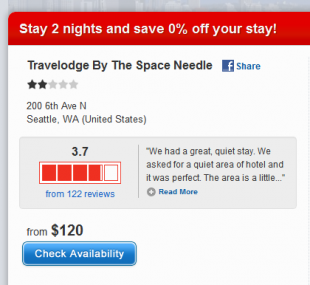Hotels.com’s New Facebook App Offers Hard-to-Find Deals, but Not in a Good Way
Stay two nights and save 0% on your stay!
 That’s just one of the offers being pitched on Hotel.com’s new Facebook application called “Deals.”
That’s just one of the offers being pitched on Hotel.com’s new Facebook application called “Deals.”
In the race to be more social and compete against discount daily deal sites like Groupon and LivingSocial, or mobile apps like HotelTonight, there’s more than one example of traditional travel sites having a hard time getting it right.
Yesterday, Hotels.com, an affiliate site of Expedia, threw its hat into the ring with its own Deals Facebook application, which claims to deliver “tailored deals that are informed through user preferences and friend activity.”
But not only is it difficult to understand how to apply a discount, sometimes the app even spells it out in black and white that there is not a discount at all.
For example, the offer for a downtown Seattle hotel listed at the very top of my results offers: “Stay 2 nights and save 0% off your stay!” At a Hilton in San Francisco, it offered rooms from $161, but when specific travel dates were entered into the search bar, the room rate jumped to $237 — the same amount offered on the Hotels.com site. Additionally, a summer sale was offering 20 percent off the stay at the Hilton, but it was not at all clear how to redeem that offer, and the prices never changed.
A spokesperson did not immediately reply to emails seeking comment.
 Besides providing deals, the application also taps into your social network to make booking rooms more informed by people you know. After connecting to Hotels.com through my Facebook account, I was able to add destinations such as Honolulu, London, Paris, Rome and others to my wish list.
Besides providing deals, the application also taps into your social network to make booking rooms more informed by people you know. After connecting to Hotels.com through my Facebook account, I was able to add destinations such as Honolulu, London, Paris, Rome and others to my wish list.
I was also able to see that 61 of my friends have visited San Francisco, 19 friends had visited Sea-Tac (as in, the Seattle airport), and 17 friends had visited San Jose. Unfortunately, none of my friends have been to Rome, although I don’t believe that could possibly be the case.
After clicking around on a number of features, I never saw specific hotel recommendations from a friend — and I’m not entirely sure if that will be a feature. But pulling off a clever social integration is difficult because of the magnitude of places to visit and hotel rooms to stay in. As an example, TripAdvisor launched a Friend-of-a-Friend feature in April, which allows users to see if a hotel has been reviewed by Facebook friends and their immediate friends. Before extending it beyond immediate friends, it was always hit or miss, but now connections are frequent.
Providing meaningful connections is difficult, so getting the discounts right would seem like the easy part. But apparently it’s not. I noticed that when Priceline released a new mobile phone app in April, it also struggled to make the promotions clear and meaningful enough to make it worthwhile to continue coming back to use it again.
The app, which launched under its Booking.com subsidiary, pitched last-minute hotel deals at up to 50 percent off. But from what I could tell, Booking Tonight was a replica of its online site, offering the same selection of hotel rooms at the same price.
By offering social and mobile applications without a clear value to the consumer, it’s like leaving a placard hanging on the knob telling start-ups to come in and clean house.








